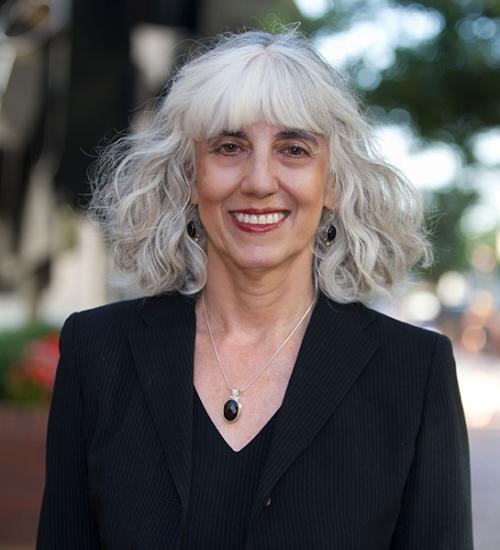
Dr. Marguerite Pappaioanou
Recently named One of UC Davis’s “55 Remarkable Women”, Dr, Marguerite Pappaioanou reflected with Director Janet Foley about her early interest in the MPVM and what that meant for her career. Marguerite was the oldest of three kids and loved animals- as eldest it often fell to her to care for the family pets. She loved science too, and veterinary medicine seemed a perfect marriage of work with animals and science. She initially aspired to work in companion animal private practice over the course of her professional life.
Dr. Pappaioanou’s veterinary education was done at Michigan State University, followed by three years in companion animal private practice. At MSU she was inspired by her parasitology and herd health instructors; discovering a passion for international health to improve both human and animal health, and the principals of evidence-based population medicine. Her parasitology professor, who had studied under Dr. Calvin Schwabe, advised her to apply to the MPVM program at UC Davis to learn epidemiology and statistics, and fundamentals of disease prevention and control—areas which would be critical for pursuing a career in international health. Her plan had been to enter and complete the MPVM program in one year, then to look for international worlk.. However, those plans went a bit sideways when Dr. Calvin Schwabe, her MPVM Project faculty advisor, recruited her to work under him as a post-doctoral research fellow, to conduct an evaluation of the Echinococcus granulosus control program on the island of Cyprus in a program to obtain a PhD, which would allow her to further hone her skills in epidemiology, statistics, and disease control.
The bulk of her years of professional work was done at CDC in Atlanta where she worked as an epidemiologist on projects in Africa, Southeast Asia, and Latin America focused on malaria prevention and control, HIV sero- surveillance, surveillance and control of emerging infectious diseases, food safety, and capacity building projects such as strengthening the skills of decision makers in Ministries of Health to use data for policy formulation and program management. One of her most important projects was directing CDC support in the development of the evidence-based “Guide to Community Preventive Services: What works in public health”, targeted toward U.S. local and state public health agencies and institutions. Eventually she was named Associate Director of Science and Policy for the Office of Global Health.
She retired from CDC in 2005, to take a faculty position in the School of Public Health at the University of Minnesota where she directed a research grant on the human-animal interface of avian influenza viruses. However, she was encouraged to apply for the position of Executive Director of the Association of American Veterinary Medical Colleges (AAVMC) in 2007, and when offered the position, located in Washington DC, she jumped at the chance as it was a way to give back to the veterinary medical profession. After four years at AAVMC, another opportunity came her way. She was recruited by CDC to serve as its liaison to FDA for Food Safety—also located in Washington DC. Given her respect and loyalty to CDC, and the opportunity to protect the country’s food safety, she returned to CDC for three more years to serve in this capacity. At this juncture in her career, she decided to go into semi-retirement, and to move to a place where mountains, the sea, and forests are all present-- Seattle Washington.
She credits the veterinary training she received at Michigan State University, and her MPVM and PhD studies at UC Davis, with giving her fundamental, and many crucially needed skills, overall flexibility and an openness to taking advantage of unplanned opportunities, as instrumental in her success throughout her career. During her MPVM and PhD studies, she became a really good epidemiologist, with skills in outbreak investigation, statistics, evaluating and using different diagnostic tests, and more. She took electives in statistics, food safety, medical entomology, zoonotic diseases, livestock development in developing countries, and more-- subject content she has drawn upon over her entire career, in multiple positions at CDC, the University of Minnesota, and most recently at the University of Washington.
She considers herself semi-retired, now living in Seattle, but still active and working to try to make the world a better place. Although her move to Seattle was a quality of life choice, she consults, and has joined the University of Washington, School of Public Health, Center for One Health Research, as an affiliate professor, where she advises the Center for One Health Research on their strategic plan, and lectures and advises students. She volunteers on the SeaDoc Society Science Advisory Committee, and with the Puget Sound Environmental Monitoring Steering Committee, looking after human, animal, and Puget Sound ecosystem health indicators. In her spare time, she spends a lot of time outdoors, walking the hills of Seattle, hiking and snow-shoeing in area forests, and swimming and kayaking in Lake Washington and Puget Sound. However, these days, with COVID 19, she is mostly sheltering in home and staying abreast of all we are learning about the emergence and spread of SARS-CoV-2, and the disease it causes.
So when you need a break from work, even work you love, and you need to be careful about maintaining distance from other people, you can watch movies. Her favorite, without requiring even a second of thought, is Dr. Strangelove, which if you don’t know satirizes mutually assured destruction. Maybe this choice of a favorite reflects a love for tight dialogue and subtle puns, but also a philosophy that you should never take yourself too seriously. Maintaining her sense of humor, a never-ending optimism and enthusiasm for life, with a strong and continued commitment to help people, animals, and the ecosystems we depend on for life, in a quest to make the world a better place, has led to a wonderful, blessed life and one very exciting career.
